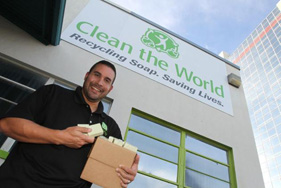Big green idea bubbles up: recycling 200 million tons of US hotel soap

Clean the world aims to use discarded hotel soap to combat disease
Clean The World CEO Shawn Seipler shows new soap bars made from soap thrown away at hotels in Orlando, Florida. The soaps are shipped around the world to needy populations.
Take a moment to consider the afterlife of hotel bathroom amenities…
Some soaps and toiletries are adopted by guests and transported to new sink countertops and showers. Most, however, are thrown away
According to Clean the World – there is a third way, a winding journey slick with suds and good intentions.
It’s a way that came to Florida business traveler Shawn Seipler as he pondered the soap in his Minneapolis Holiday Inn room one day in 2008. Curious about the ultimate fate of the bar he’d barely used, he trotted down to the front desk to ask about its post-checkout destiny. It would be tossed, he learned. It was an answer he’d hear 30 more times during an informal poll of hotels conducted with his friend Paul Till.
The American hospitality industry is a big waster, creating nearly 200 million metric tons of solid waste per year, according to the Environmental Protection Agency. Of that heap, only 30 percent is recycled.
That wet bar of soap in a Minneapolis hotel led Seipler and Till to found Clean the World, another blade in the hotel industry’s growing "green" movement. The Orlando-based organization opened in 2009 with the twin goals of protecting the environment and improving sanitation in developing nations to help combat the biggest health threats to children: acute lower-respiratory infection and diarrheal disease.
Since then, the group has partnered with nearly 1,300 lodgings in North America and Puerto Rico and has handed out more than 10 million bars of soap in 45 countries, including El Salvador, Zimbabwe, Mongolia and Romania. The soap you used after, say, a romp in Disney World could wind up in the clutches of a child in Mali or a family in Haiti.
"We knew that 1 million soaps were getting thrown away every day and that there were 9,000 children dying a day," said Seipler. "This lights the fire to try to help and save them."
Recycling hotel toiletries isn’t Clean the World’s own eco-invention. Hotels have been doling out reprocessed soaps and toiletries for years, but on a much smaller scale. A quarter-century ago, according to Pat Maher, environmental consultant to the American Hotel & Lodging Association, properties would allow their housekeeping staff to take the items home to use or share with their neighbors. At the turn of this century, a Texas organization started distributing hotel hygiene products to Mexican communities. Grass-roots groups also collected amenities and handed them out to local homeless shelters and hospitals.
Clean the World "took a lot of the little things that were going on and stepped them up," said Maher. It was a critical expansion, considering that there are 4.8 million guest rooms in the United States, each outfitted with an array of toiletries.
Others have joined the cause. In 2009, Derreck Kayongo, a Ugandan refugee, founded the Global Soap Project, a Georgia-based nonprofit group that recently shipped 10,000 bars of soap to the new country of South Sudan and has forged a partnership with Hilton Worldwide, a big fish in the hotel industry pond. The Downstream Casino Resort in the tri-state area of Oklahoma, Missouri and Kansas created with Joplin Workshops the Hand in Hand program in 2010. The group delivers kits stocked with recycled products (source: the 222-room casino, the Hilton Garden Inn in Joplin, Mo., and the Hotel Phillips in Kansas City, Mo.) to local charitable centers.
How to clean soap:
Till and Seipler started their enterprise in a single-car garage in South Florida. They also had a large obstacle to overcome: figuring out how to clean the soap, a redundant concept until you look at some of the donated stuff. (One word: hair. One response: ick.) They set up a lab in a friend’s garage, improvising with Kenmore cookers, a meat grinder and soap molds.
Since moving into their current space in a marginal section of downtown Orlando, they’ve upgraded their machinery. Now the process begins when workers use a vegetable peeler to remove the top layer of soap (and along with it, all that hair) and douse it in a bleach solution. Then a machine grinds the used soap down to pellets that resemble broken crayons. With a quick change of parts, the same machine mixes the ground-up soap with glycerine and water, shapes the goo into a long brick, then slices it with the precision of a master chef. The finished products — a mishmash of hotel brand soaps, honeydew green in color and smelling of spring freshness — roll down the belt. The squares drop into cardboard boxes, ready for shipment to faraway lands.
The Orlando facility processes more than 40,000 bars of soap a day, mainly from properties on the East Coast, such as the Peabody Orlando and the Disney chain. The center in Las Vegas covers the West Coast, including Laguna Beach, Calif., the first city to collaborate with the organization, and the Strip casinos. The newest operation in Cincinnati will focus strictly on rebottling liquid amenities. Overall, the company, which weighs each incoming donation on a giant scale, has prevented 1.2 million pounds of waste from languishing in landfills.
"It’s such a classic no-brainer," said Marshall Kelberman, the Peabody Orlando’s rooms division director.
"It’s volunteer now, but I wouldn’t be offended if it was regulatory."
Valere Tjolle
Valere is editor of the Sustainable Tourism Report Suite 2012 Special Offers HERE
 United Kingdom
United Kingdom United States
United States Asia Pacific
Asia Pacific












































Dozens fall ill in P&O Cruises ship outbreak
Turkish Airlines flight in emergency landing after pilot dies
Boy falls to death on cruise ship
Unexpected wave rocks cruise ship
Woman dies after going overboard in English Channel